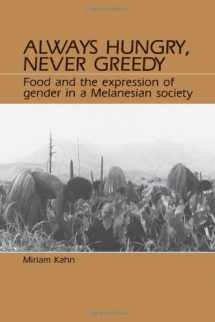
Always Hungry, Never Greedy: Food and the Expression of Gender in a Melanesian Society
Book details
Summary
Description
The Wamira people of Papua New Guinea display what outsiders would describe as an obsession with food. Who owns how many pigs, how much taro grows in whose garden, and who contributes what food at a feast, are all questions uppermost in their thoughts. Wamirans account for this preoccupation by saying that they suffer from perpetual "famine." They explain this by means of an elaborate and colorful myth about Tamodukorokoro, a monster who would have brought them abundant food, but whom, in typical Wamiran style of fearing what they desire, they chased away. In this carefully crafted and beautifully evocative book, Dr. Kahn, who lived with the Wamira people for two and a half years, argues that Wamirans' "famine" has in fact little to do with the belly. For Wamirans, concepts of food and hunger are cultural constructs. By means of food, they objectify emotions, balance relations between men and women, communicate rivalries among men, and ultimately, control the ambivalent desires that they fear would otherwise control them. Effectively combining analyses of myths and symbols with analytical accounts of subsistence and ritual behavior, Dr. Kahn writes with a degree of nuance that takes the reader beyond academic analyses into the experience of the ethnographer and the daily lives of the people with whom she resided.
Title of related interest also available from Waveland Press: Harris, Good to Eat: Riddles of Food and Culture (ISBN 9781577660156).


We would LOVE it if you could help us and other readers by reviewing the book
Book review



